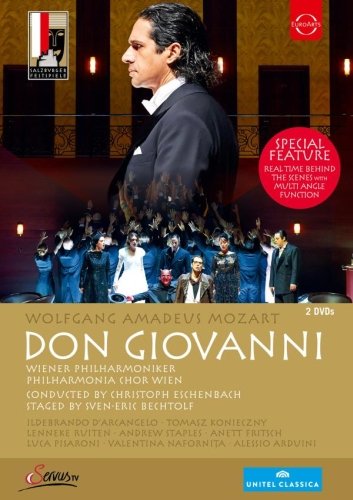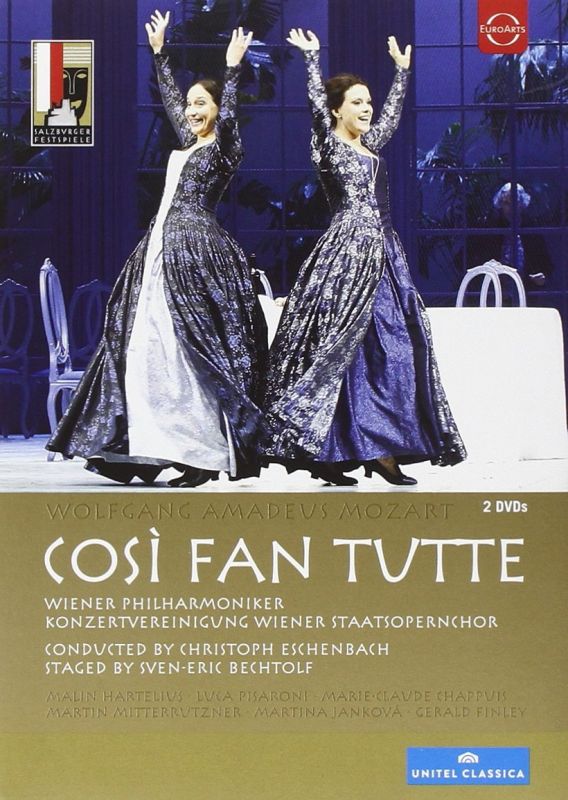MOZART Cosi fan tutte; Don Giovanni
View record and artist detailsRecord and Artist Details
Composer or Director: Wolfgang Amadeus Mozart
Genre:
Opera
Label: Euroarts
Magazine Review Date: 10/2015
Media Format: Digital Versatile Disc
Media Runtime: 180
Mastering:
DDD
Catalogue Number: 207 2738

Tracks:
| Composition | Artist Credit |
|---|---|
| Don Giovanni |
Wolfgang Amadeus Mozart, Composer
Alessio Arduini, Masetto, Baritone Andrew Staples, Don Ottavio, Tenor Anett Fritsch, Donna Elvira, Soprano Christoph Eschenbach, Conductor Ildebrando D'Arcangelo, Don Giovanni, Bass-baritone Lenneke Ruiten, Donna Anna, Soprano Luca Pisaroni, Leporello, Bass-baritone Tomasz Konieczny, Commendatore, Bass-baritone Valentina Naforniţa, Don Ottavio, Soprano Vienna Philharmonia Choir Vienna Philharmonic Orchestra Wolfgang Amadeus Mozart, Composer |
Composer or Director: Wolfgang Amadeus Mozart
Genre:
Opera
Label: Euroarts
Magazine Review Date: 10/2015
Media Format: Digital Versatile Disc
Media Runtime: 200
Mastering:
DDD
Catalogue Number: 207 2748

Tracks:
| Composition | Artist Credit |
|---|---|
| Così fan tutte |
Wolfgang Amadeus Mozart, Composer
Christoph Eschenbach, Conductor Gerald Finley, Don Alfonso, Baritone Luca Pisaroni, Guglielmo, Baritone Malin Hartelius, Fiordiligi, Soprano Marie-Claude Chappuis, Dorabella, Mezzo soprano Martin Mitterrutzner, Ferrando, Tenor Martina Janková, Despina, Soprano Vienna Philharmonic Orchestra Vienna State Opera Chorus Wolfgang Amadeus Mozart, Composer |
Author: Richard Lawrence
That said, this is well worth seeing. Rolf Glittenberg’s set is a conservatory, full of potted trees. The two girls are tellingly dressed by Marianne Glittenberg in near-identical costumes, as are their lovers. There is much snooping: the men observe the sisters soaping each other in the bath, the officers eavesdrop on Alfonso breaking the news of their imminent departure. Alfonso and Despina witness the stilted conversation about the weather. If we are to infer that Fiordiligi – more eavesdropping – recognises Guglielmo at the end of ‘Il core vi dono’, the idea is not taken any further.
It is all beautifully performed by a convincingly young-looking cast. Malin Hartelius sings a ravishing ‘Per pietà’, complemented by a heart-stopping pianissimo at the third iteration of the clarinet’s B major phrase. Martin Mitterrutzner’s free, easy tenor is just right for the high-lying part of Ferrando. Despina’s ‘In uomini’ and Guglielmo’s ‘Donne mie’ are angry and serious respectively: misconceived, but done well by Martina Jankovà and Luca Pisaroni. Gerald Finley is a wryly humorous Alfonso. Under Christoph Eschenbach, the Vienna Philharmonic is admirably light on its feet.
Pisaroni turns up again as a first-rate Leporello in Don Giovanni, produced last year with the same conductor, director and designers. The setting is a hotel lobby, with a bar to one side. Leporello is lounging, cigar and wine at hand, while Giovanni is with Donna Anna upstairs. When the Commendatore appears, it’s actually Anna who stabs him – Giovanni’s hand on hers – with the kitchen knife with which she had defended herself. (This is easy to miss, but play it in slow motion.) Bechtolf is very good at bringing out Anna’s obsession with her father. In ‘Non mi dir’ she cradles the Commendatore’s bust (which does duty for the statue) before kissing it at the end. Lenneke Ruiten sings it well, the coloratura not taken too fast; as so often, one does wonder why Don Ottavio puts up with such a pain in the neck.
Donna Elvira is equally obsessed, but with Giovanni: she hugs and kisses him even while storming at him for abandoning her. At the end she is already dressed in a nun’s habit, ready for the convent. Eschenbach takes ‘Mi tradì’ fast, enabling Anett Fritsch to sing the long phrases with perfect control. Valentina Naforni¬a is a charming Zerlina, stripping off for Masetto in ‘Vedrai, carino’. The standard composite version is performed: Andrew Staples sings Ottavio’s arias with fluency and grace. Ildebrando D’Arcangelo is Don Giovanni to the life: romantic, insouciant, courageous. During the final sextet he rises, touches or kisses all the others except Masetto, and pursues a maid into the wings. Excellent support, as in Così, from conductor and orchestra.
Don Giovanni is given twice, the second version intercut with offstage activity and not terribly illuminating interviews. I enjoyed both of these productions; but for more traditional versions, try Nicholas Hytner’s Così from Glyndebourne (Opus Arte) and Francesca Zambello’s Don Giovanni from Covent Garden (Opus Arte, 7/09).
Discover the world's largest classical music catalogue with Presto Music.

Gramophone Digital Club
- Digital Edition
- Digital Archive
- Reviews Database
- Full website access
From £8.75 / month
Subscribe
Gramophone Full Club
- Print Edition
- Digital Edition
- Digital Archive
- Reviews Database
- Full website access
From £11.00 / month
Subscribe
If you are a library, university or other organisation that would be interested in an institutional subscription to Gramophone please click here for further information.




